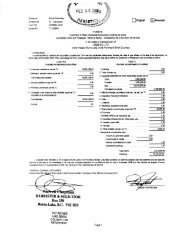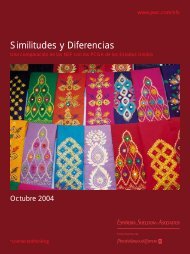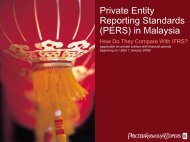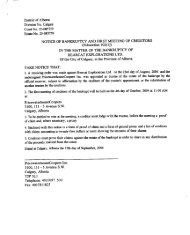TLS Newsletter 11 marzo 2011 - PwC
TLS Newsletter 11 marzo 2011 - PwC
TLS Newsletter 11 marzo 2011 - PwC
You also want an ePaper? Increase the reach of your titles
YUMPU automatically turns print PDFs into web optimized ePapers that Google loves.
sull’iscrizione a ruolo penda una contestazione giudiziale<br />
o amministrativa, fa ritenere che in presenza di un<br />
ruolo oggetto di contestazione, il contribuente che ha effettuato<br />
la compensazione sia indenne da sanzione solo<br />
se il debito non viene confermato in sede giurisdizionale<br />
o amministrativa.<br />
Sul punto è auspicabile un chiarimento da parte dell’Amministrazione<br />
Finanziaria al fine di stabilire se il divieto<br />
di compensazione è applicabile anche in presenza di<br />
cartelle di pagamento scadute derivanti da iscrizioni<br />
a ruolo a titolo non definitivo (i.e.: articolo 15, DPR n.<br />
602/1973).<br />
Compensazione delle somme iscritte a ruolo<br />
A norma dell’articolo 1, Decreto Ministeriale, che attua<br />
le disposizioni contenute nel suddetto articolo 31 in<br />
tema di compensazione delle somme iscritte a ruolo, il<br />
pagamento (anche parziale) delle cartelle esattoriali può<br />
essere effettuato tramite la compensazione dei crediti<br />
d’imposta attraverso il modello di pagamento unificato<br />
(F24), di cui all’articolo 17, Decreto Legislativo n.<br />
241/1997.<br />
E’, inoltre, consentito compensare anche i debiti scaturenti<br />
da avvisi di accertamento non impugnati, ovvero<br />
dalle iscrizioni a ruolo provvisorie in presenza di ricorso<br />
contro l’avviso di accertamento. A questo riguardo, si<br />
ricorda che, in base a quanto statuito dall’articolo 29,<br />
Decreto Legge n. 78/2010, a decorrere dal 1° luglio 20<strong>11</strong>,<br />
saranno attivi gli “accertamenti esecutivi”, con la conseguenza<br />
che gli avvisi notificati al contribuente, una volta<br />
decorsi 60 giorni, costituiranno titolo esecutivo.<br />
Di fatto, la nuova norma concede la possibilità di saldare<br />
eventuali debiti iscritti a ruolo mediante il meccanismo<br />
della compensazione senza esborso di denaro da parte<br />
del contribuente.<br />
Al riguardo si segnala che, ai sensi dell’articolo 4, Decreto<br />
Ministeriale, in caso di compensazione parziale il<br />
contribuente deve indicare preventivamente le posizioni<br />
debitorie cui imputare i pagamenti. Qualora il contribuente<br />
non proceda ad alcuna comunicazione l’imputazione<br />
sarà effettuata dall’Agente della Riscossione ai<br />
sensi dell’articolo 31, DPR n. 602/1973, titolato “Imputazione<br />
dei pagamenti”.<br />
A norma del successivo articolo 5, invece, nel caso in cui<br />
i versamenti risultino eccedenti il debito, l’Agente della<br />
Riscossione provvederà, una volta verificata l’effettiva<br />
sussistenza del credito utilizzato in compensazione, al<br />
rimborso previa apposita istanza presentata dal contribuente.<br />
Profili sanzionatori<br />
Da ultimo, a norma dello stesso articolo 31, al contribuente,<br />
che compensa senza prima adempiere i debiti insoluti,<br />
sarà applicata la sanzione pari al 50% del minore<br />
importo tra debiti iscritti a ruolo e credito compensato.<br />
Tale sanzione non sarà, in ogni caso, applicabile fino al<br />
momento in cui sull’iscrizione a ruolo penda una contestazione<br />
giudiziale o amministrativa.<br />
or administrative dispute is pending, suggests that in the<br />
presence of a taxroll subject to a dispute, the taxpayer who<br />
made the offset is free from penalties if that taxroll debt is<br />
not confirmed.<br />
About this point, it is advisable a clarification by the Italian<br />
Tax Authorities in order to determine whether the offset<br />
prohibition is also applicable in case of a non definitive<br />
expired tax bill (i.e.: Article 15 of DPR 602/1973).<br />
Offsetting of debts entered in the taxrolls<br />
Pursuant to Article 1 of Ministerial Decree, which implements<br />
the provisions of the above Article 31 regarding the<br />
offsetting of amounts entered in the taxrolls, the payment<br />
(also part of it) of the tax bills can be made through the<br />
tax credits offset with the payment unified form (F24) of<br />
Article 17 of Legislative Decree 241, 1997.<br />
Moreover, It is possible to offset the debts arising from noncontested<br />
tax assessment notices or provisional taxrolls in<br />
the presence of an appeal against the assessment notice. In<br />
this regard, please note that, according to Article 29 of Law<br />
Decree 78, 2010, effective from July 1st 20<strong>11</strong>, the so called<br />
“executive tax assessments” will be active, so that the tax<br />
assessment notices notified to the taxpayer will be enforceable<br />
once the term of 60 days expired.<br />
In fact, the new provision grants the possibility to pay<br />
taxrolls through the mechanism of the offset, without any<br />
outlay of money by the taxpayer.<br />
In this regard, it should be noted that under Article 4 of<br />
Ministerial Decree, in case of partial compensation, the<br />
taxpayer must communicate in advance the debt positions<br />
which he intends to pay off through the offset. If the taxpayer<br />
does not provide with any communication, the relevant<br />
allocation will be done by the Collector Agent in accordance<br />
with Article 31 of Presidential Decree No. 602 of 1973 entitled<br />
“Allocation of Payments. “<br />
In accordance with Article 5, instead, if the offset amount<br />
exceeds the debt, the Collector Agent will provide, after<br />
verifying the actual existence of credit used to offset, with<br />
the reimbursement after a specific request to be filed by the<br />
taxpayer.<br />
Penalties<br />
Finally, pursuant to the same Article 31, a penalty equal to<br />
50% of the lower amount between taxrolls and the tax offset<br />
credits will be applied to the taxpayer who offsets before<br />
paying off the tax debts. This penalty will not be applicable,<br />
however, until there is a judicial or administrative dispute<br />
in course.<br />
21 <strong>TLS</strong> <strong>Newsletter</strong> n° 3 Anno 20<strong>11</strong>
















